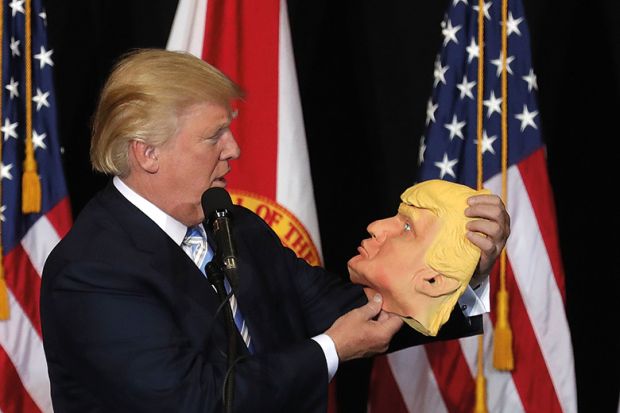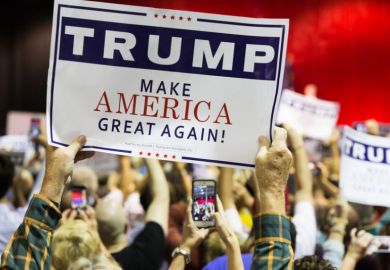Donald Trump’s proposed budget, unveiled in March, has only further fanned the wildfire of concern across US academia sparked by his surprise election.
Nor is his precipitous proposed drop in science funding the only thing that has people worried. Critics also point to his controversial ban on immigration from certain predominantly Muslim countries and his withdrawal of his predecessor’s permission for transgender students to use the public bathroom that matches their gender identity. Some predict a drop in the number of international students; others, the return of for-profit schools or a wave of anti-intellectualism.
But academics should prepare for a surprise. Although he campaigned on saving blue-collar jobs, Trump might have a better chance of saving theirs.
The US claims unassailable supremacy in higher education. Our colleges and universities are the envy of other countries, and are vital to our economic, political, scientific and cultural future. We should all be concerned about protecting them.
Although federal sources contribute less than 10 per cent of higher education budgets, the government wields considerable influence. It ties research money and federal student loan and grant programmes to compliance with the executive’s directions. As well as transgender rights, Barack Obama used his authority to campaign against campus sexual assault and to hold for-profit colleges accountable for student success.
In the case of Trump, his imprint will be a much-needed fiscal discipline. Higher education’s financial situation is grim. State funding hasn’t caught up to pre-recession levels, and state legislatures look set to continue that trend. As a result, students have borne higher tuition fees, while campuses have cut back services and increased class sizes and student-to-teacher ratios. Academics have suffered the steady adjunctivisation of teaching positions, and institutions have found themselves less able to focus on their key missions of education, research and service.
Despite Trump’s perceived disdain for intellectuals and experts, he will do them a great service if he forces them to face their circumstances and adopt the efficiencies that other businesses have embraced for decades. From small liberal arts colleges to large university systems, institutional inertia and politics currently leave administrators frustrated and unable to pursue sound fiscal policy.
Examples abound. College departments purchase student records software independently, resulting in lost economies of scale and significant back-engineering costs to allow compatibility across the institution. Individual schools and university systems keep employees in expensive positions that should be automated or consolidated. Each university system campus needlessly keeps its own purchasing staff, reducing buying power.
Trump has said: “Much of the skyrocketing cost of college education is due to the tremendous bloat in college administrators and bureaucrats.” He’s correct – and the reasons are usually easy to understand. Sometimes they amount to mere self-interest or pride, but they also involve thorny structural challenges and empathy for those who will lose jobs.
At today’s universities, autonomy feeds quality research and teaching like oxygen feeds fire. But at the organisational level, decentralisation has become a gathering storm that threatens to extinguish it. During the presidential campaign, Trump said: “If the federal government is going to subsidise student loans, it has the right to expect that colleges work hard to control costs and invest their resources in their students.” His focus on waste reduction is apparently so thorough that he has openly criticised the budget bloat of two military projects – the F-35 fighter plane and Air Force One – even though the overall defence budget is the rare federal expenditure that he favours increasing.
Many academics who accuse Trump of playing fast and loose with facts are being hypocritical. For years, they have refused to admit that their own hidebound refusal to embrace modern, efficiency-enhancing technological tools and organisational best practices is in large measure responsible for the financial crisis they are facing.
Last October, Trump warned: “We have a lot of power over the colleges. And they’re not doing the job of cost-cutting, because they don’t have the incentive to cost-cut.” If he can give them that incentive, professors will thank him for it in the end.
Jose Garcia served as vice-president for finance and administration at Texas A&M International University for 28 years. Don Barwick has more than 15 years of experience in procurement services for the Texas A&M University System. Joseph Garcia is founder of Mindstream, which advises on higher education issues.
POSTSCRIPT:
Print headline: Trump to the rescue
Register to continue
Why register?
- Registration is free and only takes a moment
- Once registered, you can read 3 articles a month
- Sign up for our newsletter
Subscribe
Or subscribe for unlimited access to:
- Unlimited access to news, views, insights & reviews
- Digital editions
- Digital access to THE’s university and college rankings analysis
Already registered or a current subscriber?






